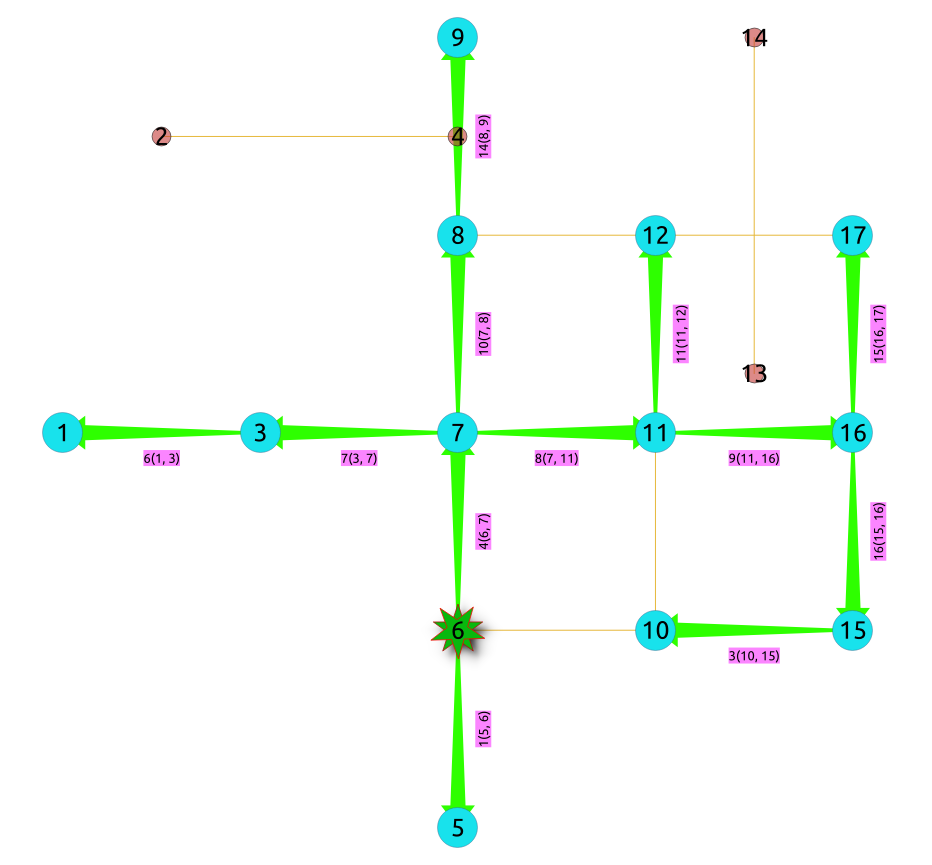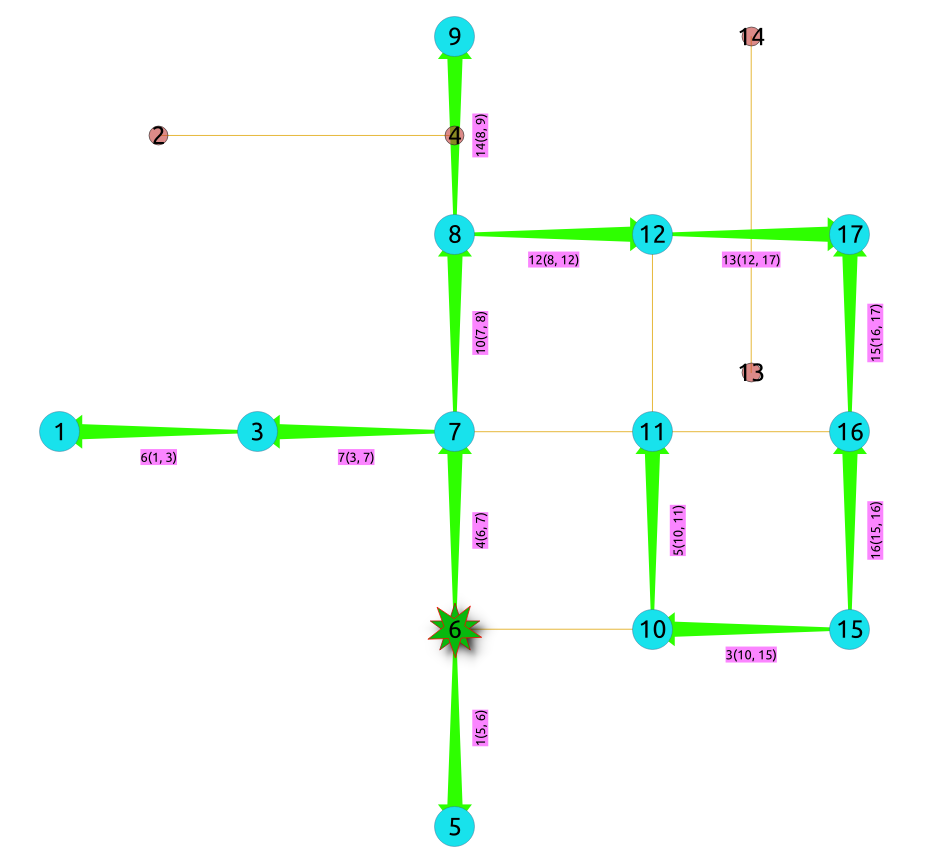pgr_depthFirstSearch - Proposed¶
pgr_depthFirstSearch — Returns a depth first search traversal of the graph.
The graph can be directed or undirected.
Warning
Proposed functions for next mayor release.
They are not officially in the current release.
They will likely officially be part of the next mayor release:
The functions make use of ANY-INTEGER and ANY-NUMERICAL
Name might not change. (But still can)
Signature might not change. (But still can)
Functionality might not change. (But still can)
pgTap tests have being done. But might need more.
Documentation might need refinement.
Availability
Version 3.3.0
Function promoted to proposed.
Version 3.2.0
New experimental function.
Description¶
Depth First Search algorithm is a traversal algorithm which starts from a root vertex, goes as deep as possible, and backtracks once a vertex is reached with no adjacent vertices or with all visited adjacent vertices. The traversal continues until all the vertices reachable from the root vertex are visited.
The main Characteristics are:
The implementation works for both directed and undirected graphs.
Provides the Depth First Search traversal order from a root vertex or from a set of root vertices.
An optional non-negative maximum depth parameter to limit the results up to a particular depth.
For optimization purposes, any duplicated values in the Root vids are ignored.
It does not produce the shortest path from a root vertex to a target vertex.
The aggregate cost of traversal is not guaranteed to be minimal.
The returned values are ordered in ascending order of start_vid.
Depth First Search Running time:
Signatures¶
Summary
[directed, max_depth](seq, depth, start_vid, node, edge, cost, agg_cost)Single vertex¶
[directed, max_depth](seq, depth, start_vid, node, edge, cost, agg_cost)- Example:
From root vertex
id
SELECT * FROM pgr_depthFirstSearch(
'SELECT id, source, target, cost, reverse_cost FROM edges
ORDER BY id',
6);
seq | depth | start_vid | node | edge | cost | agg_cost
-----+-------+-----------+------+------+------+----------
1 | 0 | 6 | 6 | -1 | 0 | 0
2 | 1 | 6 | 5 | 1 | 1 | 1
3 | 1 | 6 | 7 | 4 | 1 | 1
4 | 2 | 6 | 3 | 7 | 1 | 2
5 | 3 | 6 | 1 | 6 | 1 | 3
6 | 2 | 6 | 11 | 8 | 1 | 2
7 | 3 | 6 | 16 | 9 | 1 | 3
8 | 4 | 6 | 17 | 15 | 1 | 4
9 | 4 | 6 | 15 | 16 | 1 | 4
10 | 5 | 6 | 10 | 3 | 1 | 5
11 | 3 | 6 | 12 | 11 | 1 | 3
12 | 2 | 6 | 8 | 10 | 1 | 2
13 | 3 | 6 | 9 | 14 | 1 | 3
(13 rows)
Multiple vertices¶
[directed, max_depth](seq, depth, start_vid, node, edge, cost, agg_cost)- Example:
From root vertices
id
SELECT * FROM pgr_depthFirstSearch(
'SELECT id, source, target, cost, reverse_cost FROM edges
ORDER BY id',
ARRAY[12, 6], directed => false, max_depth => 2);
seq | depth | start_vid | node | edge | cost | agg_cost
-----+-------+-----------+------+------+------+----------
1 | 0 | 6 | 6 | -1 | 0 | 0
2 | 1 | 6 | 5 | 1 | 1 | 1
3 | 1 | 6 | 10 | 2 | 1 | 1
4 | 2 | 6 | 15 | 3 | 1 | 2
5 | 2 | 6 | 11 | 5 | 1 | 2
6 | 1 | 6 | 7 | 4 | 1 | 1
7 | 2 | 6 | 3 | 7 | 1 | 2
8 | 2 | 6 | 8 | 10 | 1 | 2
9 | 0 | 12 | 12 | -1 | 0 | 0
10 | 1 | 12 | 11 | 11 | 1 | 1
11 | 2 | 12 | 10 | 5 | 1 | 2
12 | 2 | 12 | 7 | 8 | 1 | 2
13 | 2 | 12 | 16 | 9 | 1 | 2
14 | 1 | 12 | 8 | 12 | 1 | 1
15 | 2 | 12 | 9 | 14 | 1 | 2
16 | 1 | 12 | 17 | 13 | 1 | 1
(16 rows)
Parameters¶
Parameter |
Type |
Description |
|---|---|---|
|
Edges SQL as described below. |
|
root vid |
|
Identifier of the root vertex of the tree.
|
root vids |
|
Array of identifiers of the root vertices.
|
Where:
- ANY-INTEGER:
SMALLINT, INTEGER, BIGINT
- ANY-NUMERIC:
SMALLINT, INTEGER, BIGINT, REAL, FLOAT, NUMERIC
Optional parameters¶
Column |
Type |
Default |
Description |
|---|---|---|---|
|
|
|
|
DFS optional parameters¶
Parameter |
Type |
Default |
Description |
|---|---|---|---|
|
|
Upper limit of the depth of the tree.
|
Inner Queries¶
Edges SQL¶
Column |
Type |
Default |
Description |
|---|---|---|---|
|
ANY-INTEGER |
Identifier of the edge. |
|
|
ANY-INTEGER |
Identifier of the first end point vertex of the edge. |
|
|
ANY-INTEGER |
Identifier of the second end point vertex of the edge. |
|
|
ANY-NUMERICAL |
Weight of the edge ( |
|
|
ANY-NUMERICAL |
-1 |
Weight of the edge (
|
Where:
- ANY-INTEGER:
SMALLINT,INTEGER,BIGINT- ANY-NUMERICAL:
SMALLINT,INTEGER,BIGINT,REAL,FLOAT
Result columns¶
Returns set of (seq, depth, start_vid, node, edge, cost, agg_cost)
Parameter |
Type |
Description |
|---|---|---|
|
|
Sequential value starting from |
|
|
Depth of the
|
|
|
Identifier of the root vertex. |
|
|
Identifier of |
|
|
Identifier of the
|
|
|
Cost to traverse |
|
|
Aggregate cost from |
Where:
- ANY-INTEGER:
SMALLINT, INTEGER, BIGINT
- ANY-NUMERIC:
SMALLINT, INTEGER, BIGINT, REAL, FLOAT, NUMERIC
Additional Examples¶
- Example:
Same as Single vertex but with edges in descending order of
id.
SELECT * FROM pgr_depthFirstSearch(
'SELECT id, source, target, cost, reverse_cost FROM edges
ORDER BY id DESC',
6);
seq | depth | start_vid | node | edge | cost | agg_cost
-----+-------+-----------+------+------+------+----------
1 | 0 | 6 | 6 | -1 | 0 | 0
2 | 1 | 6 | 7 | 4 | 1 | 1
3 | 2 | 6 | 8 | 10 | 1 | 2
4 | 3 | 6 | 9 | 14 | 1 | 3
5 | 3 | 6 | 12 | 12 | 1 | 3
6 | 4 | 6 | 17 | 13 | 1 | 4
7 | 5 | 6 | 16 | 15 | 1 | 5
8 | 6 | 6 | 15 | 16 | 1 | 6
9 | 7 | 6 | 10 | 3 | 1 | 7
10 | 8 | 6 | 11 | 5 | 1 | 8
11 | 2 | 6 | 3 | 7 | 1 | 2
12 | 3 | 6 | 1 | 6 | 1 | 3
13 | 1 | 6 | 5 | 1 | 1 | 1
(13 rows)
The resulting traversal is different.
The left image shows the result with ascending order of ids and the right image shows with descending order of the edge identifiers.
See Also¶
Indices and tables


